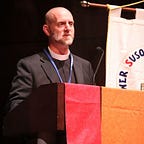I’ve got the answer…
Ask me anything. I’ve got the answer.
That’s what many people believe. And by that I mean, they believe they have the answer to everything that is posed to them. The words “I don’t know” might as well be a foreign language.
What is it about knowing the answer that we are drawn to? Why do so many have a hard time admitting that they no idea, no clue, as to why something is the way it is? Is it seen as a weakness? I’m not sure why it would. It’s really expressing an honest truth — I don’t know something. When I don’t know something, I can then open my mind and my senses to learn something new.
My kids are really good at asking me lots of questions. I’m glad they do this. More often than not my answer usually starts with “I don’t know…”
Child #3: “Why are the construction guys working on that part of the building first?”
Me: “I don’t know.”
Child #3: “Why not?”
Me: “Because I’m not working on their project and I don’t pretend to know something that I have no clue about. Good question though.”
Of course this goes beyond just innocent interactions with my children. I have come across this in many other areas of life too — science, politics, sports, food, and even what font someone uses in a document. People love to be able to claim that they know the truth about something — anything. They love to make it seem like they are in control of the knowledge and data.
Yet, so often just not true. People are really good at knowing a certain amount on any given subject, but most people are missing some vital information and so some things get left out. It’s how we end up with people holding onto the same data and coming to opposing conclusions. Generally that happens because there are several things missing. Some of the things missing are usually context, history, impact, how something is expressed, our perception, etc.
Knowing is a big thing in religion too. I think this is why there is a big draw to modern day fundamentalist type churches. They can claim they have the answers to just about anything. People are so desperate for answers to be spoon-fed to them. Yet, life isn’t that easy. It never is. We have to struggle with many things. So often life isn’t lived in the black and white of the debate of issues. Too often it is lived in the grey where people’s lives are and where there is uncertainty and messy lives and where things aren’t neat and orderly.
Pastoral care is all about walking with someone in the midst of that chaos and uncertainty. Not to tell them exactly what they should do, but rather to be there with them, to pray with them, to walk forward in uncertainty, to remind them of the promises of God, and to offer support after the decision is made and carried out. Was it the right decision or the wrong decision? So often I don’t think it’s such an easy split. Most of the time our decisions are made up of a bit of right, wrong, and something in-between.
While those who demand answers and think they know the answers to all questions and believe they know what is right and wrong in every circumstance will not like what I have just written, I can tell you without the shadow of a doubt that there are plenty of people out there that appreciate a softer approach — a more uncertain approach. It’s the approach to life that says what you need right now is not right thinking, but a right relationship — a right relationship with God, with others, with oneself, or with the rest of creation. Or at least moving in that direction. Right thinking too often gets cornered into the area of the mind and abstract issues. Yet, find me a person who is struggling with a decision. I’ll show you a person that isn’t focused on the abstract, but on a real, personal challenge that offers messy long-term options.
Debating issues is fun when you are sitting at the bar with a cold one in hand. Arguing for your side and what you believe has a place. It is a very foundational place in our lives too. yet, when we come to individual lives and what they are going through, our hard and fast “truths” struggle under the stress of real lives that are impacted by decisions.
Churches have an opportunity here. Much of it depends on context though. The opportunity for the church is to be a place, a community, where people can come as they are, walk with other people who struggle in life, and hear God’s promises for their lives and for creation. People can come, be fed, be changed, and go out into the world to walk with others who are struggling just like they are or were. And people can receive forgiveness. We may not know all the right beliefs, but we can hear words of forgiveness and grace and mercy. Those words are bound to have a deeper impact in our lives than all of the right thinking combined. And receiving forgiveness, grace, and mercy opens us up to more — to serving our neighbors and to having our lives changed. To walking with others, and talking and listening about so many things in life. And yes, even talking about right belief with others without the discussion becoming personal or being an attack on identity.
Originally published at laceduplutheran.com on January 19, 2017.
